Nick Clegg is Meta's New Denier in Chief
Imran Ahmed / Jun 11, 2022Imran Ahmed is the CEO of the Center for Countering Digital Hate.

Sheryl Sandberg’s impending departure from Meta has confirmed what has been on the cards for some time – Nick Clegg’s status as the company’s de facto number two, at least when it comes to policy and communications.
Overseeing communications and policy for most of her tenure, Sandberg has rightly been held responsible for Meta’s now infamous strategy: when confronted with crises, initially deny their existence, then deflect blame, and finally delay action until the storm has passed.
Although the COO title will officially be inherited by Javier Olivan, it is Clegg, the former Member of Parliament and Deputy Prime Minister of the United Kingdom who is now Meta’s recently promoted President of Global Affairs, who has already assumed Sandberg’s responsibility for spinning the company’s way out of disasters and lobbying against regulation and greater accountability.
Before founding the Center for Countering Digital Hate (CCDH), I worked on the frontline of British politics, where I had a front row seat to Clegg’s rise to power and fall from grace. As a seemingly modernizing leader of the Liberal Democrats, his appeal to younger, progressive voters across the country delivered his party to peacetime government for the first time in almost a century.
These days he is known as the man who broke both the spirit and the letter of virtually all of his pre-election promises at his first contact with power – many of which were held dear by his party’s core vote. In the most egregious example, he trampled on his pledge to oppose any increase in university tuition fees to allow the Conservatives to triple them.
Perhaps more damningly, he betrayed his party’s deeply liberal grassroots in offering the key votes needed to usher in an era of severe and socially-regressive public spending cuts – which disproportionately harmed the most vulnerable groups in British society.
Clegg and the Lib Dems were rightly punished by the electorate. They lost all but eight of their 57 Parliamentary seats at the following general election, while David Cameron’s Conservatives won an outright majority.
As a politician, he failed because he refused to accept any responsibility for the mistakes he and his party made. Since he joined Meta and began expanding his purview, there is nothing to suggest he has learned his lesson.
For years, CCDH and other organizations have worked tirelessly to provide proof of Meta’s unethical practices and corporate negligence. Thanks to whistleblowers like Frances Haugen, we know that executives have sat on evidence that its products harm users. And yet, as Clegg’s stature has grown, the company has doubled down on bad faith attacks and a refusal to accept any responsibility for the harm being done to its users.
Clegg has argued that one of Ms. Haugen’s key revelations – that the company has known for some time that Instagram harms children – was “mischaracterized”. Earlier last year, Zuckerberg even argued that “using social apps to connect with other people can have positive mental health benefits and well-being benefits.”
Except researchers had already reported in an internal presentation in 2019, that “we make body image issues worse for one in three teen girls.” Another internal slide presentation, in March 2020, reported that “32% of teen girls said that when they felt bad about their bodies, Instagram made them feel worse.”
Clegg has also rubbished the established link between certain types of harmful content and company profits, without offering a shred of evidence. He insists that “Facebook’s systems are not designed to reward provocative content” – but our own research has proven the opposite is true.
Launching the Metaverse last year, the company repeatedly asserted that safety would be built into the products “from day one”. But elsewhere he sought to distance Meta even from the notion that it has a responsibility to keep people safe in virtual reality spaces accessed on Meta’s platform, arguing that “the Metaverse is far, far bigger than Meta”. And just last month, away from the glare of the launch day spotlight, he quietly admitted that Meta is, in fact, still working out how it thinks it will keep children and vulnerable users safe in VR.
This failure to take responsibility let anti-vaxxers run riot. On March 24, 2021, we published the Disinformation Dozen report, which showed that up to 65 percent of anti-vaxx content circulating on Facebook and Twitter originates with sites and accounts operated by just 12 known anti-vaxxers – the Disinformation Dozen.
Sat in front of the US House Committee on Energy and Commerce the following day, Mark Zuckerberg was asked about our report and promised to do something about it. But as soon as he left, Facebook refused to play its part, claiming our report had a “faulty narrative”. Facebook would continue to do nothing even after complaints from the Surgeon General and President Biden citing our research.
However, Facebook whistleblower Frances Haugen revealed that on the very same day we released our report, Facebook produced internal research confirming that a tiny number of accounts were responsible for more than half of anti-vaccine content on the platform.
While Sandberg bears plenty of responsibility for Meta’s deceptive and underhanded practices, she was not solely responsible.
Whether the wider, rotten culture at Menlo Park can be corrected by a single executive is an open question. But with Clegg now wielding such power, and in the ascendency, the writing is on the wall. Things will continue to get worse before they get better.
Authors
